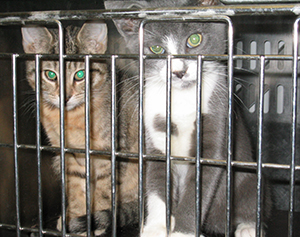Irish Government springs ‘nasty surprise’ with 2015 increase in animal testing
The Irish Government’s Heath Products Regulatory Authority (HPRA), which also enforces animal experimentation regulations, has just issued annual statistics for animal experiments in Ireland for 2015. [1]
The Irish Anti-Vivisection Society (IAVS) expresses its outrage and frustration that the Irish Government is failing to honour its commitment to reducing animal experimentation, with the number of animals used actually increasing by about 1% (2,144) since 2014 to 226,393.
Increasing toll of animal killing; cats and dogs repeatedly re-used in painful tests
The government, through the HPRA, is full of warm words about promoting the ‘3Rs’ which refers to the Replacement, Reduction and Refinement of animal experiments. Yet their decision to authorise increasing number of painful animal tests reveals a much grimmer truth.
There have been increases in the number of cats (+23 to 76) and dogs (+53 to 122) subjected to experiments, many of whom were used repeatedly in tests causing significant pain and distress. There were 135 experiments on cats and 386 on dogs that were classified as ‘moderate’ severity, which actually covers experiments involving suffering equivalent to invasive surgery such as organ transplantation, cancer, being confined in a very small cage for several days and psychological distress tests where animals cannot escape from a perceived threat of injury or death. [2] The IAVS is extremely concerned that many dogs and cats were reused time and time again in such painful and distressing tests.
Other species subjected to more experiments include horses and donkeys (+46 to 112), pigs (+2142 to 2840), cows (+7267 to 10420), frogs (‘xenopus’) (+395 to 420) and fish (+2817 to 6161). The species subjected to the most experiments was the mouse, enduring 190,585 procedures, over 80% of which were painful poisoning (‘toxicity’) tests.
The rise in animal experiments has been driven by increases in the areas of toxicity testing (up 8.1% to 148,671) and ‘basic research’ (up 22.7% to 42,347). The expansion of toxicity testing is a nasty surprise given the government’s promises to encourage the use of non-animal alternatives to test botox-type products [3], where the poison is injected into the abdomens of animals, resulting in paralysis and death.
Meanwhile, the significant rise in basic research raises major concerns about the HPRA’s ethical scrutiny of animal research proposals. Basic research involves the testing of academic scientific ideas or hypotheses in animals, with any practical benefit to humans being highly uncertain and speculative. The IAVS argues that such research should not be legal as it cannot in good faith pass the harm-benefit test which is a legal requirement for the approval of painful experiments. The rise in ‘basic research’ indicates that the HPRA is giving animal welfare very little consideration, instead allowing animals to be routinely sacrificed for the sake of academic curiosity and careerism.
On a more progressive note, the HPRA says there does ‘appear to have been’ a drop in severity, with a 31% decrease in experiments in the most painful category – ‘severe’ - compared with 2014 (down from 90,072 to 62,246). While this seems, on the face of it, to be one positive development in 2015, the uncertainty expressed by the HPRA itself regarding these figures raises concerns about the reliability of the data. Even the lower figure of 27% of experiments being ‘severe’ is still relatively high compared with the UK, who report 6% of their experiments as ‘severe’.
IAVS chairperson Yvonne Smalley comments:
‘The IAVS again calls on the Irish Government to honour its legal and ethical commitment to tackle animal experimentation. The Government and HPRA needs to stop turning a blind eye to animal cruelty and implement meaningful policies to achieve consistent and significant reductions in the number of animals used and the pain inflicted on them by testing companies and academics.
Science Foundation Ireland’s recent first-ever call for research proposals for the development of replacement methods for animal tests [4] is a welcome step in the right direction. But animal protection, human health and the Irish public demand a serious, coherent policy to move away from crude, unreliable and cruel animal research.’
Notes:
[1]http://www.hpra.ie/docs/default-source/publications-forms/newsletters/2015-statistical-report---scientific-animal-protection.pdf?sfvrsn=6
[2]See Annex VIII ‘Severity Classification of Procedures’ of Directive 2010/63/EU, downloadable from http://eur-lex.europa.eu/legal-content/EN/TXT/PDF/?uri=CELEX:32010L0063&from=EN
[3]http://oireachtasdebates.oireachtas.ie/debates%20authoring/debateswebpack.nsf/takes/dail2012070300412?opendocument
[4]http://www.sfi.ie/funding/funding-calls/open-calls/science-foundation-ireland-investigators-programme-2016.html


